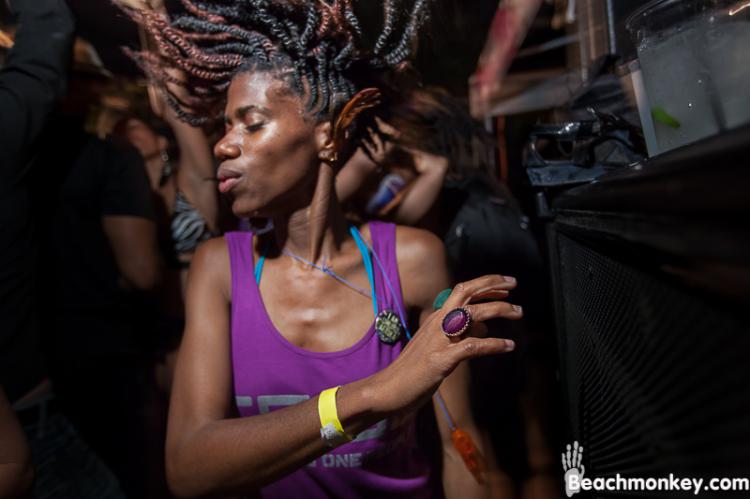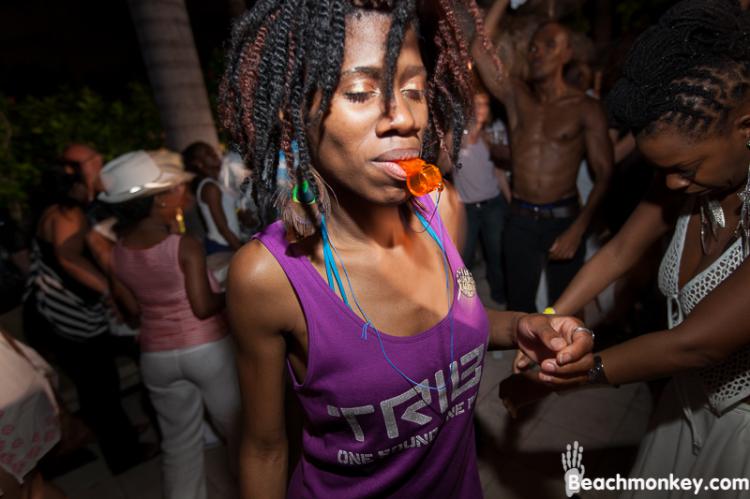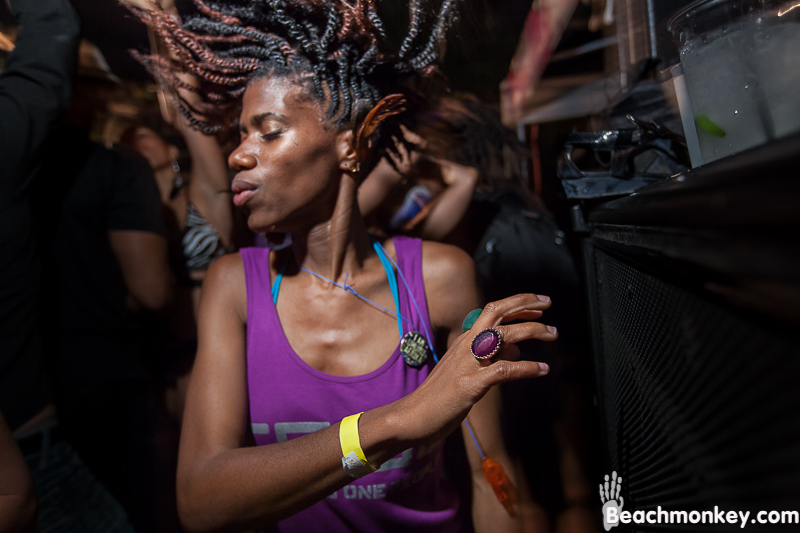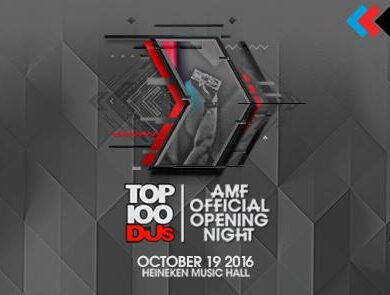ZIYAWA! Day IV of WMC
Mickey Weems

Three days down, two more to go.
Saturday March 12 was a day of surprises, pleasant ones. The first and biggest surprise was South African Miami Invasion, a party at the South Seas Hotel featuring Black Coffee, the rising DJ star from Johannesburg, South Africa.
It took us maybe 15 minutes to walk to South Seas. Little did I know that the distance between SOBE and Soweto was only a couple of blocks. And it was the beautiful Soweto of our dreams: glamorous, pulsing, and powered by some of the heaviest house beats I would hear all week.
I know a few people in the industry, and if I could have teleported them to the party, I would have done so. This is the future of house, especially deep funky house, and the future looks real good. The groove laid down by the DJs went out to the crowd (about 80 percent African), and the crowd amplified it. This was not the frantic bouncing in place that one sees at a Tiesto function. This was all about hips. My favorite moment was when a South African track was playing, and then watching about half the crowd singing the lyrics. In Zulu.
In Zulu!
There were people from all over Africa, but most were from Johannesburg and Durbin in South Africa (SA) proper. I spoke with a smiling young man named Ndumiso Shabane (a.k.a. Cleo). It was he who told me the song we were hearing was in Zulu. I asked him how it felt to witness his fellow South Africans in Miami during WMC, and he said, “I feel great!”
Then, from an upper level, a voice from heaven began singing some of my favorite house songs, including “The Real World” by Masters at Work. Vikter Duplaix was crooning, or rather, caressing the crowd. People who were singing in Zulu were now singing along with Vikter in English: “Welcome to the real world, ain't no time for fun and games.”
The music and the people had every bit the high-class club style of a Miguel Migs Salted party (more on that later!), but with the added embodied sophistication and hopeless romantic allure that Africans, both on the continent and in the Diaspora, bring to the dance floor. Where did these people get their sophistication? I would soon find out.
Beachmonkey was there with the camera and was having a field day with the crowd, which was not at all camera shy. Boisterous yet respectful, everyone moved in an almost telepathic unity, yet each one behaved as an individual. The DJ booth was a constant flow of people, who were at times almost on top of the DJ. It was as if the physical closeness were a necessary ingredient in generating a nearly irresistible invitation to join in.
When Things Click: Lerato and Fresh
I could not, however, continue to party with the crowd. Beachmonkey introduced me to Lerato Maunatlala, one of the organizers of the event. A petite and charming woman, she took me by the hand away from the party for an on-the-spot interview. I left the dance floor in delicious agony at having to separate from the magic.
We sat close together, not completely out of earshot from the music (thankfully). During the interview, we were touching, a further layer of unexpected intimacy. “It's our second time here,” she said. “Last year, no hotel wanted to host us.” The party was a collaborative effort between herself and artists such as DJs Fresh and Euphonik, both of them superstars in the South African house scene with their own radio shows

Lerato's last name, Maunatlala, has a click in it (situated in the “tl”), and hearing her speak her name was the first time I'd ever heard such a sound in conversation. I had to stop myself from asking her to say it over and over again.
She had to return to her duties, and we walked back to the DJ booth just as Fresh was finishing his set. I then had a chance to speak with him, and discovered that house music is to South African youth what hip-hop is to Americans. But it was initially a challenge to convince Americans in the electronic music scene to give them a chance during Miami Winter Music Conference. When asked what his favorite thing was about this year's WMC, he said, “I think probably being taken seriously.”
Fresh and his companions have already made a name for themselves in their own country. “We started our own conference in South Africa, the Southern African Music Conference,” he said. Their motto is, “Remember that the beat began in AFRICA and will forever be ours!”
>When I say that house music is big in SA, it's not just any house. They like it deep. One does not hear Deadmou5 as much as Roland Clark, not so much David Guetta but Osunlade and a host of incredibly talented South Africans. This was why deep house star Wayne Tenent and the aforementioned Vikter Duplaix were happily singing live at the function with SA singer Bucie (who was wonderful, by the way). They are heroes in the Deepest South, and the South African Miami Invasion party gave them a chance to perform before an adoring crowd. They also want to support South African artists. “Roland Clark performed for nothing,” Fresh added. “Look out for South African house music. We've made it.”
Euphonik and Chappell
My next interview was with Euphonik. “I grew up with house music,” he said, dropping names like Black Box, Frankie Knuckles, Groove Theory, Soul II Soul. “South Africa is one of the biggest house music markets in the world.” Euphonik and his compatriots are educating South Africans (and eventually the world) in who's who in house music, from Barbara Tucker to Kenny Bobien to their own rising superstars.
>Euphonik gave me an indication of just how popular he and house are. “I have 150,000 friends on Facebook,” he said, and showed me his Twitter account: 28,000. One entry said a single word, “Ziyawa!!!” translated as “It's happening!!!” I did not discover in which of SA's many languages.
“House music in general is bringing Black and White people together,” he said. As if to prove the point, two White South African men approached Euphonik, saying, “We listen to you on the radio all the time!” as they shook his hand. Euphonik told me the same thing about the Miami Invasion I'd heard earlier: “We paid for it out of our own pockets.” Africans from all over the USA were contacted months earlier to come to the Invasion, and indeed they did, as did also Dutch and American fans.
One man who combines both Dutch and American sensibilities is the deep house singer Chappell. He moved to Holland from the USA because there was not enough support for him as an artist in his home country. “I work all over the world, but not here,” he told me. But Chappell is adored in SA. “They know my songs better than me,” he said.
Chappell and the SA house scene usher a new age in deep house. Most of the inspiration for deep house tracks is profoundly religious, with rhythms and roots in African American Spirit-filled church as well as the praise of God-Saints in New World African communities. But Chappell does not come out of Black Church, Christian or otherwise. Like Toronto's Lisa Shaw, Chappell is a person of African descent who is at least one generation removed from a gospel choir and bembé.
The leading lights of American deep house, so closely tied to AfriChristian music ministry, have inspired a new generation of unchurched house musicians at home and overseas. I eagerly await the new sounds, which I have no doubt will be just as spiritual.
As we were leaving the party to go to Body And Soul NYC next door, we passed two SA women. Although they were White, we knew they were South African because they knew the words to songs the DJs were spinning, some English songs, some not. One woman wore a dark wooden medallion of Africa around her neck as she and her friend whirled, danced and laughed. This is what Ashton Deyzel and Clarissa Ettwein had to say, in the finest boastful WMC fashion: “Down south, the Dirty South, proudly South African!! Durban, the place to be!”


